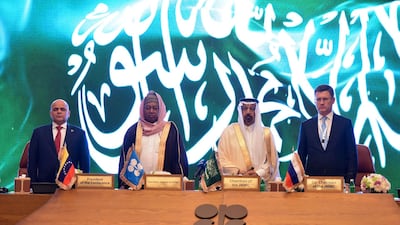Saudi Arabia and Russia, which lead an alliance to correct oil market supply said Opec+ would prioritise lowering crude inventory levels, while ensuring customers are well supplied, ahead of a technical committee meeting in Jeddah.
Early indications are that Opec+ as the alliance is known is likely to rollover current output curbs of 1.2 million barrels per day in place since January into the second half of the year.
"My recommendation to my Opec+ colleagues will be to drive oil inventories down gently but to remain on the trajectory of bringing them down to normal levels while marking sure that no refinery and no customer is left without their crude requirement,” Saudi energy minister Khalid Al Falih said ahead of the joint ministerial monitoring committee session in the Saudi Red Sea city.
The alliance had responded with cuts at Opec’s annual meeting in Vienna last year to correct oversupply in the market, which saw prices plummet by 30 per cent by year-end after rising to a three-year high of $86.2 per barrel in October.
However, key producers Saudi Arabia and the UAE have come under pressure from the US to boost supply following the Trump administration’s cancellation of waivers to Opec member Iran towards the end of April.
The move to drive Iranian barrels to zero was widely feared to create shortage in the market, with the loss of nearly a million bpd from the markets.
Mr Al Falih said the market situation remained "quite foggy” with “multiple signals” facing the markets.
He also asked for conformity within the alliance to be more “evenly distributed” and said it was not acceptable for some countries, the kingdom more specifically to shoulder the burden of the cuts. Saudi Arabia, whose production averaged 9.7 million bpd for April according to Opec estimates has been cutting back 500,000 bpd more than its allocation to balance the markets.
Mr Al Falih noted that it was “critical” that hasty decisions were not made by the convening technical committee given “the complexity of data and evolving situation.
He also denounced recent attacks against two Saudi Aramco tankers off the coast of Fujairah as well as on a 5 million bpd capacity East-West pipeline in the kingdom as “deplorable” but said supplies weren’t affected.
Saudi Arabia announced earlier today an emergency summit of Gulf and Arab leaders scheduled for May 30 to discuss the recent attacks.
Russian energy minister Alexander Novak said Opec+ should not be restricted to discussions of just production volumes and noted that it was important to solidify their current co-operation.
Russia, the largest sovereign producer as well as Saudi Arabia, the de-facto leader of Opec have looked to evolve into a supergroup to counter rising US production and dominance in the oil markets.
Mr Novak added that the markets could expect the alliance to maintain "solidarity and a pragmatic approach”.
Venezuelan oil minister Manuel Quevedo, who holds Opec presidency denounced what he called "US siege of its oil industry” which he blamed for the loss of production of around 600,000 bpd since the end of last year.
A “measured approach” was needed by the alliance despite an expected drop-off in demand in 2019 compared with last year, and noted that the group should observe “complex geopolitical observances”.


